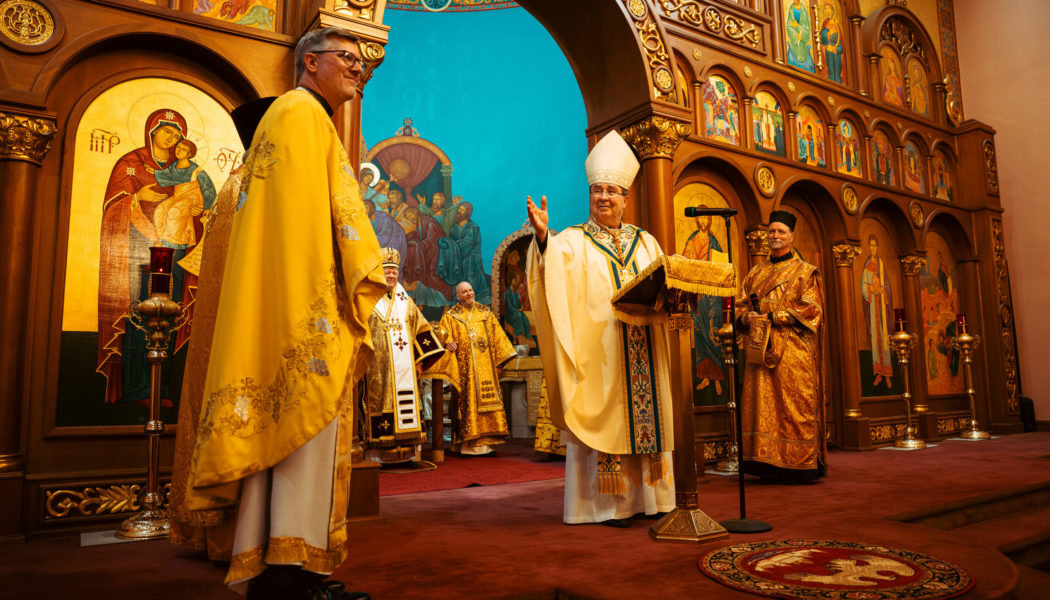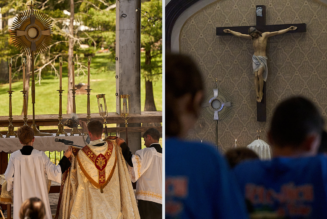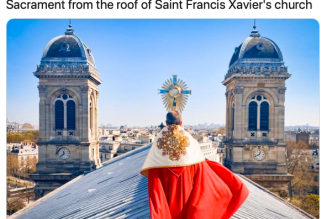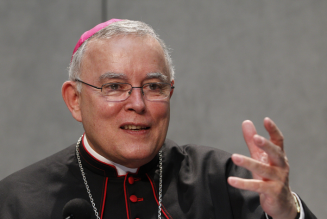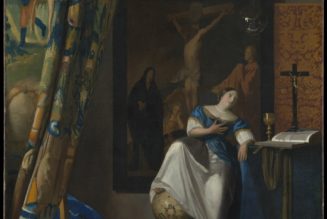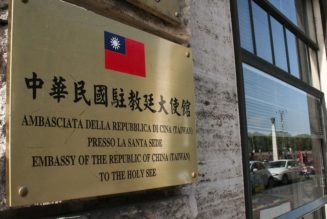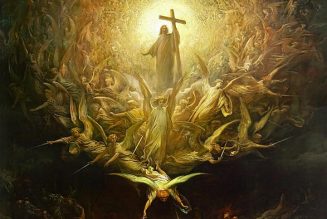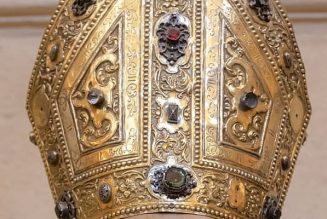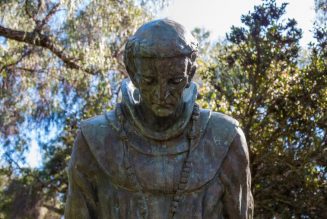Bishop Robert Mark Pipta, a former seminary rector and priest of the Eparchy of Phoenix, is the Ruthenian Bishop of Parma, Ohio.
The three duties (munera) of a bishop are to teach, sanctify and govern. To teach, a bishop needs “intellectual humility,” so he teaches recognizing his own weakness. To sanctify, a bishop needs to remind his people of the unseen realm and always strive to bring people into an encounter with the holy. To govern, a bishop needs to be in tune with the Holy Spirit, who gives strength and wisdom to govern God’s holy people.
These ideas were expressed by Bishop John Michael Botean to the newly ordained Bishop Robert Mark Pipta during the homily at the Divine Liturgy for the Ordination and Enthronement of a new bishop for the Eparchy of Parma for the Ruthenians on Nov. 8 in Euclid, Ohio. It was an occasion of great joy for the universal Church, but most especially for the Eastern Catholic Churches in the United States.

On the Feast of the Synaxis of St. Michael and the Holy Angels, Bishop Robert was ordained. It was an apt day to call on the intercession of all the heavenly hosts.
I got to know Bishop Robert a little bit through my four years of diaconal formation at Byzantine Catholic Seminary in Pittsburgh, where he was our rector. Consequently, I can provide a little insight into the Ruthenian Church’s newest bishop.
What first struck me about (then) Father Robert was his attention to detail. He very much likes everything in its place. This made him an ideal instructor for our liturgical practicum and chant classes. Learning the proper rubrics for serving the Divine Liturgy, and beauty in liturgical expression, are very important to Bishop Robert. In my deacon class of 16 men, we made a lot of mistakes during our liturgical practice. Despite our missteps, Father Robert was always patient in his correction — a good quality for a bishop, no doubt.
Where he really came alive was during our chant classes. Bishop Robert has a profound knowledge and love for music. He studied music at the University of California at Irvine. I recall chanting one of the litanies during our practicum class. Father Robert asked if I could sing a little higher. Despite trying several times to fulfill his request, I could not. With a frightened look on my face, I looked at him and he chuckled and we moved on.
His instruction and leadership through our four years of formation left a lasting impression on all of us deacon candidates. I am sure that the same attention to detail, kind correction and understanding demeanor will serve him well as he begins his episcopal ministry.

The ordination of a new bishop in the Byzantine rite is a remarkable experience. The ordination itself takes place after the Trisagion (“Holy God, Holy and Mighty, Holy and Immortal, have mercy on us!”) before the epistle reading. The candidate is led around the altar three times by his three consecrators. In Bishop Robert’s case, this was Metropolitan William Skurla (Archeparchy of Pittsburgh), Bishop Kurt Burnette (Passaic) and Bishop Nil Lushchak (Eparchy of Mukachevo).

The candidate kisses each corner of the altar while the “Dance of Isaiah” is sung during the last pass. The text is, “Rejoice, O Isaiah! The Virgin was with child and bore a Son, Emmanuel. He is God and Man. His name is Rising of the Sun. By extolling him, we bless the Virgin.” This is the same text used at every ordination and during the Mystery (Sacrament) of Crowning (Marriage) — as a man is the head of his family, so too each of the ordained (and the bishops most perfectly) share in the image of Christ as Head of the Church.

The candidate then kneels at the center of the altar, resting his head upon it. The book of the Gospels is held aloft over his head and the three consecrators lay their hands on the candidate’s head and pray the prayers of consecration. As the people assent to his ministry by proclaiming “Axios!” (Greek for “He is worthy!), the newly consecrated bishop is then vested with his episcopal vestments — the sakkos (a vestiture taken from the Byzantine emperors), the omophorion (pallium), the Panagia (an icon of the Theotokos worn on a chain at the bishop’s breast) and the crown (miter). These new vestments encapsulate visual and symbolic representations of his office to teach, sanctify and govern.

The Divine Liturgy continues as usual until the time of the enthronement, which follows the reception of Holy Communion. The new bishop is led to the throne in the Holy Place (sanctuary) and seated. Then he is greeted with the kiss of peace by the attending bishops and all of the priests and deacons of his Eparchy in attendance. This moment is a moment of fraternal love, as the new bishop is officially welcomed by his clergy to begin the work of ministry with them as co-workers in the vineyard. In witnessing the episcopal ordination one senses that it’s more than the elevation of a man to a higher office (though it is that of course) — it’s a feeling of delving more deeply into the vocation of service that all ranks of the clergy share in.

I believe this is confirmed by Bishop Robert’s choices for his episcopal coat of arms. What was unsurprising was his choice of images. He chose an icon of St. Romanos the Melodist, a 6th-century Byzantine hymnographer and composer. It was not Romanos’ talent for singing or melody that allowed him to write hymns of tremendous theological depth — it was his sanctity and humility. This won him acclaim in Constantinople. Despite his acclaim, he remained a humble deacon in the Church of Constantinople and served the Church as a musician and sacristan for the remainder of his life. His life of humble service is a model for Bishop Robert’s episcopal ministry.
The scroll that the saint holds on the bishop’s coat of arms reads, “May I obey what I preach and be the first to do what I teach” — an apt motto for a new bishop. St. Romanos is also connected with the Feast of the Holy Protection of the Mother of God and is often depicted on her icon. The eparchy where Bishop Robert hails from (the Eparchy of Phoenix) is under the patronage of the Holy Protection of the Mother of God, as is the entire Metropolitan Church of Pittsburgh.

Bishop Robert grew up in California and was an active member of Annunciation Byzantine Catholic Church in Anaheim. He was ordained to the priesthood in 1994 and served at a variety of parishes across the Eparchy of Phoenix (formerly the Eparchy of Van Nuys). He began his service to the Byzantine Catholic Seminary of Sts. Cyril and Methodius in 2014 and served on the Intereparchial Liturgy and Music Commissions and also served as a vocation director for 19 years. His record of service to the Church recalls Pope Francis’ desire for shepherds to have “the smell of their sheep.” Bishop Robert’s extensive pastoral service combined with his experience in administration will doubtless make him an effective servant-leader to the people of the Eparchy of Parma.

An occasion of such joy for all of God’s people, Bishop John Michael (Eparchy of Canton for the Romanians) said:
I am looking forward to working with my new neighbor in Parma, and to getting to know him better. I really think he will be a strong, positive, pastoral presence not only among Byzantine Catholics in his Eparchy, but his new ministry will give his thoughtful voice the platform he deserves. Many years, Your Grace!
Bishop François Beyrouti (Melkite Catholic Eparchy of Newton) said:
I have known Bishop Robert for over 10 years since he was the pastor of Holy Angels Byzantine Catholic Church in San Diego. I also had the blessing of collaborating with him while he was the rector of Sts. Cyril and Methodius in Pittsburgh, Pennsylvania. I find Bishop Robert to be a highly organized individual who takes everything he does very seriously. With his vast parish and seminary experience, Bishop Robert will bring a vast range of knowledge and pastoral insight into his new role as bishop of the Byzantine Eparchy of Parma. I look forward to collaborating with him in whatever way the various Eastern Catholic churches can share resources and experience so that we can always be united and stand with each other to serve our parishes.
We all take this occasion to congratulate Bishop Robert on his episcopal ordination and pray for his fruitful ministry!
Mnohaja i blahaja l’ita — God grant you many years!
For more information about Bishop Robert visit the Eparchy of Parma website.
[embedded content]
